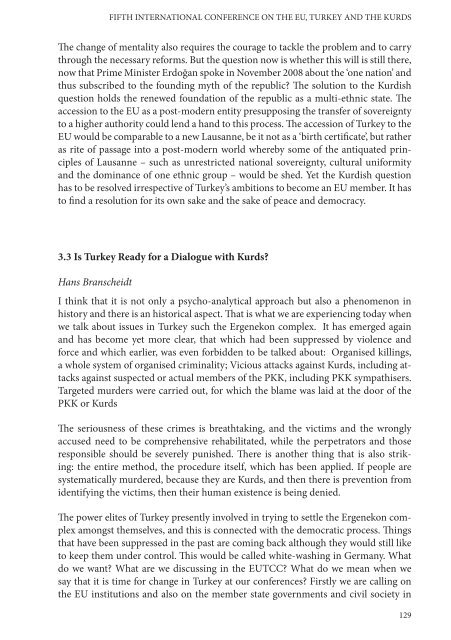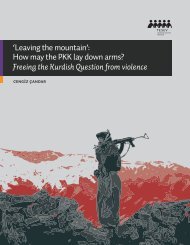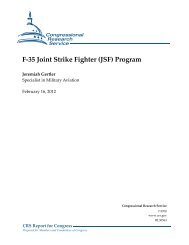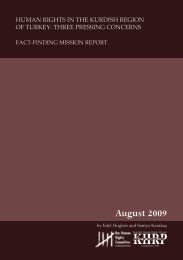FIFTH INTERNATIONAL CONFERENCE ON THE EU TURKEY AND THE KURDS
fifth international conference on the eu, turkey and the kurds
fifth international conference on the eu, turkey and the kurds
You also want an ePaper? Increase the reach of your titles
YUMPU automatically turns print PDFs into web optimized ePapers that Google loves.
<strong>FIFTH</strong> <strong>INTERNATI<strong>ON</strong>AL</strong> <strong>C<strong>ON</strong>FERENCE</strong> <strong>ON</strong> <strong>THE</strong> <strong>EU</strong>, <strong>TURKEY</strong> <strong>AND</strong> <strong>THE</strong> <strong>KURDS</strong><br />
The change of mentality also requires the courage to tackle the problem and to carry<br />
through the necessary reforms. But the question now is whether this will is still there,<br />
now that Prime Minister Erdoğan spoke in November 2008 about the ‘one nation’ and<br />
thus subscribed to the founding myth of the republic? The solution to the Kurdish<br />
question holds the renewed foundation of the republic as a multi-ethnic state. The<br />
accession to the <strong>EU</strong> as a post-modern entity presupposing the transfer of sovereignty<br />
to a higher authority could lend a hand to this process. The accession of Turkey to the<br />
<strong>EU</strong> would be comparable to a new Lausanne, be it not as a ‘birth certificate’, but rather<br />
as rite of passage into a post-modern world whereby some of the antiquated principles<br />
of Lausanne – such as unrestricted national sovereignty, cultural uniformity<br />
and the dominance of one ethnic group – would be shed. Yet the Kurdish question<br />
has to be resolved irrespective of Turkey’s ambitions to become an <strong>EU</strong> member. It has<br />
to find a resolution for its own sake and the sake of peace and democracy.<br />
3.3 Is Turkey Ready for a Dialogue with Kurds?<br />
Hans Branscheidt<br />
I think that it is not only a psycho-analytical approach but also a phenomenon in<br />
history and there is an historical aspect. That is what we are experiencing today when<br />
we talk about issues in Turkey such the Ergenekon complex. It has emerged again<br />
and has become yet more clear, that which had been suppressed by violence and<br />
force and which earlier, was even forbidden to be talked about: Organised killings,<br />
a whole system of organised criminality; Vicious attacks against Kurds, including attacks<br />
against suspected or actual members of the PKK, including PKK sympathisers.<br />
Targeted murders were carried out, for which the blame was laid at the door of the<br />
PKK or Kurds<br />
The seriousness of these crimes is breathtaking, and the victims and the wrongly<br />
accused need to be comprehensive rehabilitated, while the perpetrators and those<br />
responsible should be severely punished. There is another thing that is also striking:<br />
the entire method, the procedure itself, which has been applied. If people are<br />
systematically murdered, because they are Kurds, and then there is prevention from<br />
identifying the victims, then their human existence is being denied.<br />
The power elites of Turkey presently involved in trying to settle the Ergenekon complex<br />
amongst themselves, and this is connected with the democratic process. Things<br />
that have been suppressed in the past are coming back although they would still like<br />
to keep them under control. This would be called white-washing in Germany. What<br />
do we want? What are we discussing in the <strong>EU</strong>TCC? What do we mean when we<br />
say that it is time for change in Turkey at our conferences? Firstly we are calling on<br />
the <strong>EU</strong> institutions and also on the member state governments and civil society in<br />
129





